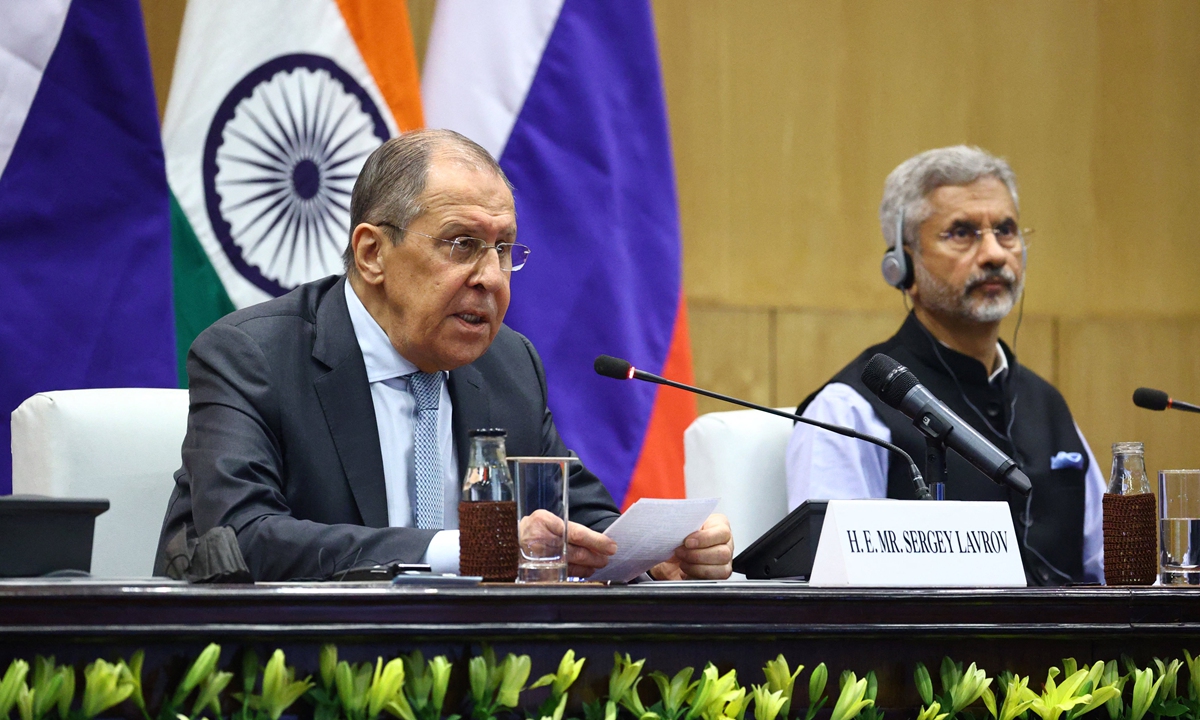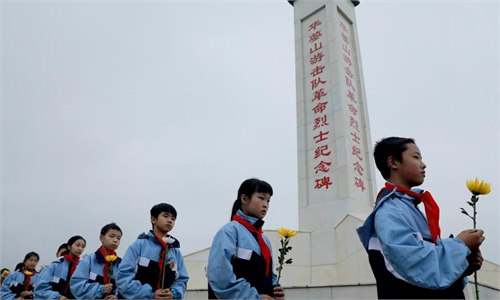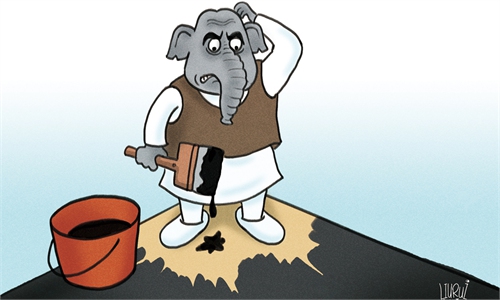Striking a balance between Russia and Quad difficult for India

This handout picture released on April 6, 2021 by the Russian Foreign Ministry shows Russian Foreign Minister Sergei Lavrov (L) and India's Foreign Minister Subrahmanyam Jaishankar as they attend a press conference after their meeting in New Delhi. Photo: AFP
On Monday, Russian Foreign Minister Sergei Lavrov met with India's External Affairs Minister Subrahmanyam Jaishankar. They discussed a range of issues, including the Indo-Pacific situation. New Delhi-based media outlet Wion, on Tuesday reported that, "India's position is clear. It will not engage in a NATO-like military alliance with the Quad and that's the challenge for Delhi, striking the right balance between Russia and the Quad."
India's strategy is to maintain a balance between great powers in a bid to maximize its national interests. But it is hard to achieve in practice. This is especially so when current US-Russia ties continue to deteriorate. As Reuters claimed, "Moscow's ties with Washington are at a post-Cold War low." Against this backdrop, India's strategy of trying to please both sides is easier said than done.
India has collaborated with the Quad and Russia, but has divergences with both of them. For example, in terms of containing China, India has seldom publicly mentioned China in this regard. This is different from Washington, Tokyo, and Canberra. Furthermore, India's human rights conditions were criticized by the West last month. All these mentioned above will impair India's relations with the Quad.
On Tuesday, Indian media outlet the Print reported Jaishankar reiterated that he sees Moscow as a "key partner" in New Delhi's Indo-Pacific initiative, something that Russia called "anti-China" policy. It is noticeable that when referring to the region, Russia uses "Asia-Pacific" instead of "Indo-Pacific." Washington and New Delhi prefer to use the latter framework to target China. This illustrates that Moscow, as a strategic partner of China, is on the same page with Beijing on this issue.
Both Russian President Vladimir Putin and Foreign Minister Lavrov have repeatedly claimed that Moscow opposes any anti-China alliance.
In 2019, in his speech at the final plenary session of the 16th meeting of the Valdai International Discussion Club, Putin argued that any attempt to create some kind of a bloc-based organization is "un-Asian to begin with" and "unlikely to be feasible." In July 2020, Lavrov strongly criticized the US-led Indo-Pacific Strategy, calling it as "an attempt to put together a group of countries that would openly… contain China's development."
By saying that, Moscow cautions New Delhi against joining organizations like the Quad. It also believes that India's involvement in this US-led anti-China mechanism will upset the balance in the Indo-Pacific region, and also affect Moscow's relations with New Delhi. Therefore, Russia is currently very unsatisfied with India's deepening ties with the Quad mechanism.
Moreover, Russian military equipment may also contribute to India's difficulty in maintaining a balance between Russia and the Quad; to be more specific, with the US. Talks between Russian and Indian foreign ministers also touched on the ongoing discussions between the two over the additional production of Russian military equipment in India. This is being discussed despite US objections. This might anger Washington even more.
Defense cooperation plays an important part in what both Moscow and New Delhi consider to be their "Special and Privileged Strategic Partnership." In this regard, there is a historical bond of high level cooperation between the two: India was a partner with the Soviet Union back in the day.
Still, India is attempting to secure its balance between the two major military powers that are also India's old and new military partners. It may be not feasible and even leave both Russia and the US feeling unpleased.
But for India, procuring military equipment itself is the most important objective. The equipment from Russia is often more compatible with India's current weapons systems. If India buys both US and Russian weapons at the same time, this will produce more problems for the Indian army in terms of logistics and joint warfare capabilities.
The author is director of the research department at the National Strategy Institute at Tsinghua University. opinion@globaltimes.com.cn



